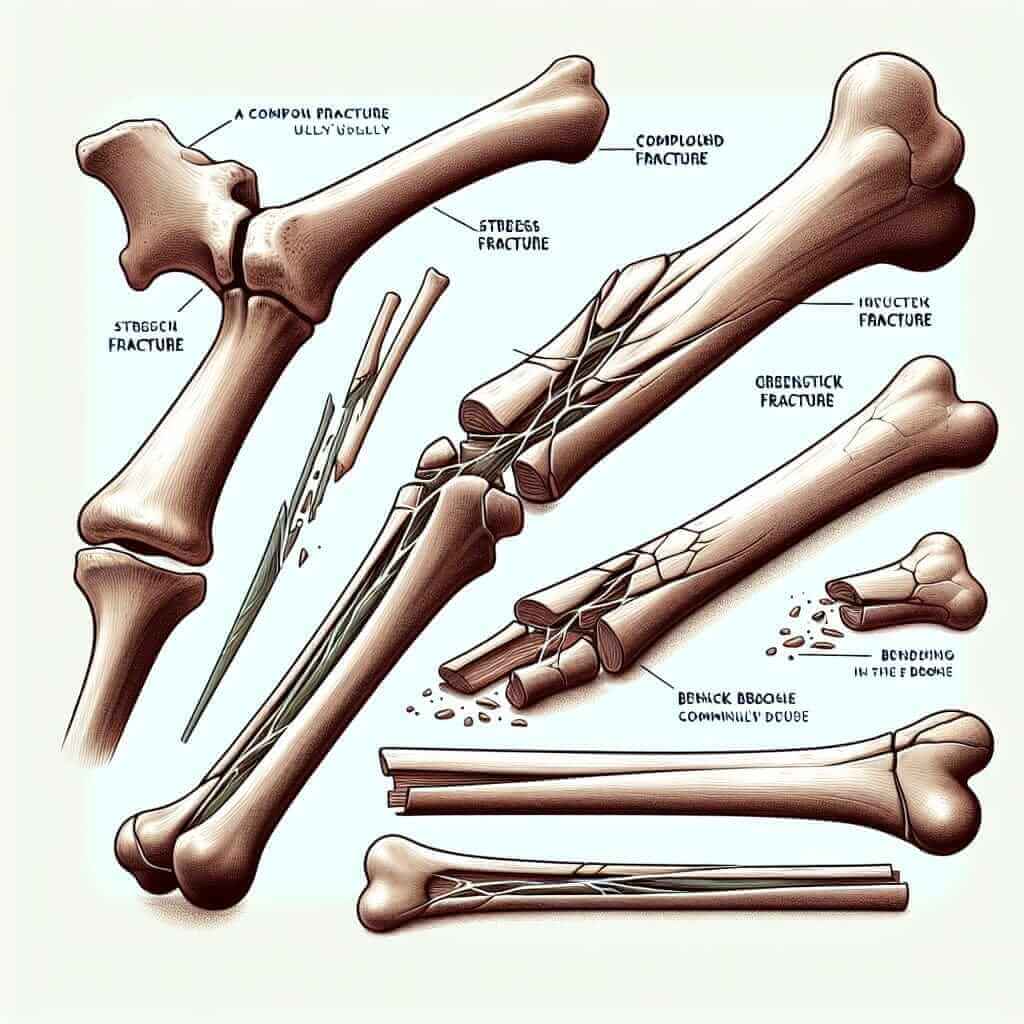The word “fracture” is a common term in the IELTS exam, particularly in the Listening and Reading sections related to healthcare. Understanding its meaning and usage can significantly impact your band score. In this article, we will delve into the intricacies of “fracture” and its related vocabulary to equip you with the necessary tools for IELTS success.
Here are some synonyms and antonyms for “fracture”:
| Word | Part of Speech | Meaning | Example |
|---|---|---|---|
| Fracture | Noun/Verb | A break in a bone or other hard material. | The X-ray revealed a fracture in his tibia. |
| Break | Noun/Verb | To separate into two or more pieces due to force. | He fell off his bike and broke his arm. |
| Crack | Noun/Verb | A line on the surface of something that has split. | There was a small crack in the vase. |
| Shatter | Verb | To break suddenly into many small pieces. | The glass shattered into a thousand pieces. |
| Heal | Verb | To become healthy again after an injury or illness. | It took several weeks for his broken leg to heal. |
| Mend | Verb | To repair something that is broken or damaged. | The doctor was able to mend his fractured femur with surgery. |
Understanding “Fracture”
Definition and Pronunciation
“Fracture” (pronounced /ˈfræk.tʃər/) can be both a noun and a verb.
- Noun: It refers to a break in a bone or other hard material.
- Example: The elderly patient suffered a hip fracture after a fall.
- Verb: It means to break or cause something to break.
- Example: Excessive stress can fracture bones.
Different Types of Fractures
In a medical context, “fracture” is often used to describe specific types of bone breaks:
- Compound fracture: A fracture where the broken bone pierces the skin.
- Stress fracture: A small crack in a bone caused by repetitive stress or overuse.
- Greenstick fracture: A partial fracture in which the bone bends and cracks, but doesn’t break completely. This type of fracture is more common in children.

“Fracture” in the IELTS Exam
The word “fracture” commonly appears in the IELTS Listening and Reading sections, particularly in passages related to healthcare, accidents, or scientific research.
Listening Section
You might encounter “fracture” in dialogues about doctor-patient consultations, emergency room scenarios, or discussions about medical procedures.
- Example:
- Narrator: …The doctor examined the patient and suspected a fracture in the left wrist.
- Question: What did the doctor suspect the patient had?
Reading Section
Passages about bone health, injury treatment, or archaeological discoveries might use the word “fracture.”
- Example:
- Passage excerpt: … The archaeologists discovered ancient human remains with evidence of a healed fracture in the skull.
- Question: What did the archaeologists discover about the human remains?
Using “Fracture” in Your Writing and Speaking
While “fracture” is more common in the Listening and Reading sections, you can effectively incorporate it into your Speaking and Writing responses to demonstrate vocabulary range and accuracy.
Speaking Example:
- Examiner: “Do you think extreme sports are becoming too dangerous?”
- Candidate: “It’s true that extreme sports carry a higher risk of injury, like fractures, but with proper safety measures and training, those risks can be minimized.”
Writing Example:
- Task 2 Question: “The increasing use of technology is having a negative impact on people’s health. To what extent do you agree or disagree?”
- Response: “However, a sedentary lifestyle fueled by excessive technology use can lead to weaker bones, increasing the risk of fractures and other health issues.”
Collocations and Idioms
- Sustain a fracture: This collocation is frequently used to describe the act of getting a fracture.
- Example: The athlete sustained a stress fracture in his foot after months of intense training.
- Hairline fracture: This term describes a very thin crack in a bone that is difficult to see on an X-ray.
- Example: The doctor explained that the patient had a hairline fracture in her wrist.
- Bone-dry: This idiom describes something that is extremely dry. Although not directly related to “fracture,” it uses “bone” metaphorically.
- Example: After walking in the desert for hours, I was bone-dry.
Conclusion
Mastering vocabulary related to health and the human body, like “fracture,” is crucial for success in the IELTS exam. By understanding its various meanings, applications, and related terms, you can confidently approach different sections of the test and achieve your desired band score. Remember to practice using these words in context to enhance your fluency and accuracy.